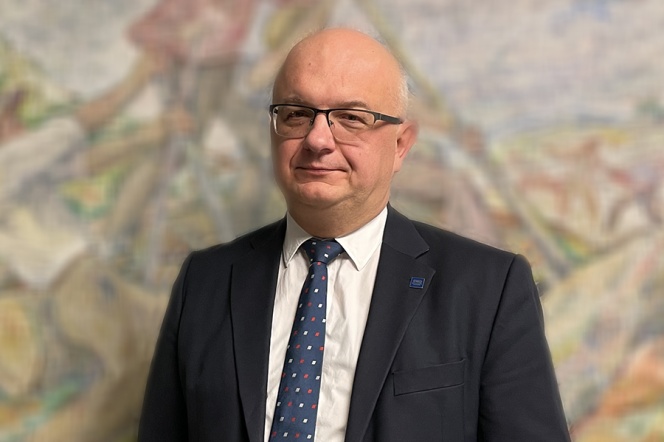Date added: 2023-05-05
EUA Conference – sums up prof. Dariusz Mikielewicz, vice-rector of Gdańsk Tech

The conference of the European Universities Association, which this year was held at Gdańsk University of Technology, is over. What are the goals of this association?
The European Universities Association brings together about 850 universities from all over Europe. The main axis of EUA's activity is the desire to create strong, cooperating universities that will compete with American or Chinese ones. At meetings, such as the conference held at Gdańsk University of Technology, we have the opportunity to get to know each other better, but also to define various types of threats and difficulties and think about how we can counteract them.
An undoubted advantage of this event is the mere fact of meeting and talking to representatives of various universities. It's a benefit that cannot be measured in any way. Discussion gives you the opportunity to bring in changes. We want the next generations to live at least as well as we do. We want to signal in which direction the world is developing, and currently the key development areas are artificial intelligence, biotechnology and other high-tech technologies. We, as members of the EUA, must look closely at this and recognize what are the possible benefits or risks of this development. We need to be able to identify and interpret them.
The motto of the conference was "We need to talk about impact". Could you explain what impact you are talking about?
During the conference, we discussed how universities and the academic community can influence the fate of the world. One of the leading topics was the war in Ukraine and the impact of this war on the whole of Europe. The problem of draining talents from Ukraine or the topic of accepting employees from Ukrainian universities - short or long-term - to other European universities so that they can continue their development were discussed. What impact does this have on the European academic community, but also how will it affect the Ukrainian state? If talented scientists leave Ukraine permanently, who will return to this country and rebuild it? However, such migrations do not concern only Ukraine, but also other smoldering areas of conflict. We are talking about the countries of the Middle East, African or Asian countries. People from these regions of the world also come to our universities. First of all they want to improve their standard of living, but also to escape from local threats.
A completely different type of "impact" - influence - also discussed during the EUA conference, is the impact associated with the emergence of European Universities, i.e. international partnerships of universities, creating extremely strong centers and scientific networks. It was discussed how to develop their potential, their impact on the further development of Europe's academic character.
The conference program also included issues related to challenges often discussed in public, such as the climate crisis or the green transformation.
These are topics that have been present in academic discourse for a long time. We have been fighting climate change for almost 30 years. This topic is up to date all the time. There was a threat that work on climate protection would be abandoned due to the energy crisis. Fortunately, this did not happen and the energy crisis was short-lived. Yet, of course, it has an impact on further development. The main European strategies, such as "Fit for 55" can be time-tested, but in terms of the shape of energy policy they are unwavering.
The conference coincided with the halfway point in the construction of the Gdańsk Tech Eco-innovation Center. How does this investment fit into the scope of EUA's activities?
By building the Eco-innovation Center, we aim to improve the quality of our teaching and research services on a national, European and global scale. We offer better and better equipment for our laboratories or new teaching techniques in order to attract the best candidates and educate them into graduates who will drive economic development. We believe that the Eco-innovation Center and its graduates will have an impact on the development in our region.
This year's EUA conference was hosted by Gdańsk University of Technology. What does this mean for the university itself, but also for its position on the academic map of Europe?
A scientific position is gained over the years through the quality of science, didactics and their organization. The organization of this conference in Poland, in Gdańsk, is a distinction for our country. We can be proud that we were noticed and awarded with such an opportunity quite quickly. Many people visited Poland and Gdańsk for the first time and became fascinated by the European nature of our city. When they left, they were delighted with our university, city and region. This is the added value of organizing this event.
It is worth mentioning that during this year's conference, a new EUA president and the association's board were also elected. Such elections are held once every four years, so we can say that it is an additional value for us that they were held in Gdańsk, a city strongly associated with freedom and democracy. We also have a representative of Poland in the aforementioned EUA board. It is Prof. Marcin Pałys, former rector of the University of Warsaw. Undoubtedly, this conference is an appreciation of our thriving academic center and - I hope - giving it an additional impetus.
About the EUA conference
The European University Association (EUA) represents over 850 universities in 49 European countries. It plays a key role in the Bologna Process and influences the European Union's policy on higher education, research and innovation. EUA representatives meet each year at a conference organized by one of the member universities.
The guests of Gdańsk University of Technology were representatives of leading universities from the European Union, but also Great Britain, Turkey, Iceland, Georgia and Ukraine.
The partners of the conference are Polpharma S.A. and Santander Universidades.

